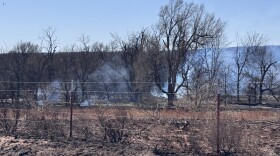A new program is training students to become helicopter pilots while in school at Max Westheimer Airport in Norman. The program, through a partnership with Semper Fly Helicopters, helps students with private pilot training, individual licensing, and flight instructor certification.
Brandi Rector is the Founder and CEO of Semper Fly Helicopters. She said Oklahoma doesn’t have as big of a rotor presence as it does fixed wing. Rector believes her company is a big step in the industry.
“This is a good idea and we can help change the industry and set a new standard for flight schools," Rector said. "And a new way to do things is what I'm trying to do and step outside the box of how flight schools have been operating in the past a little bit."
Through the program, students attend ground lectures three times a week and start flying after one week of classes. Students complete courses on private training, instrument training, and commercial training. Rector said students learn about different professions in the industry. She said there are many opportunities for helicopter pilots from firefighting , utility inspections, and EMS.
“They're going to get a lot of, see it, visualize it, and then start going through their training. I know they do a four year degree, but I think the flying portion could be done in year three and they'll have their CFII by then,” Rector said.
The program has opened doors for junior aviation major Soami Ellis.
“I've always wanted to do something and search and rescue, potentially firefighting and then EMS piloting. So they have good opportunities here. Pipeline. So that you can do things like that, which a lot of places don't have,” Ellis said.
Semper Fly Helicopters has received much recognition for the opportunities it provides to students and the helicopter industry. Not only is Semper Fly the only helicopter training program in the SEC, it’s also the only female-marine-veteran owned helicopter business in the country.
Rector did two deployments as a mechanic and door gunner before leaving the military in 2014. She said she’s experienced challenges with her gender in the military and in the industry, but she said the number of females in the industry is growing.
“I am enjoying the growth and the attention that is coming on the female aspect of the industry," Rector said. "And there's a lot of programs that are like, come in and push it. But they're building that camaraderie and they're bringing attention to the lack of females in aviation,” Rector said.
After Rector left the military, she went to Saint Louis University and got her bachelor's degree in aeronautics and pilot's license. After graduating she was hired by Customs and Border Protection, but would later find out her father was battling cancer.
Soon after she started a job as a mechanic with Air Resources her father passed away. Rector said she fell into a depression causing her to become briefly homeless with her now husband.
“There was this gap where I couldn't bring myself to do anything. We borrowed a horse trailer and it had a living quarters in it, and we had to move out of the house because we couldn't pay the rent anymore" Rector said. "And we just put our stuff in storage and we lived in a horse trailer and moved it around and parked it from place to place."

Rector said it was tough to pull herself out of the slump but knew her father wouldn’t want to see her that way. She began working for General Atomics until she was laid off during COVID and was doing interviews for a position with the FBI. Rector found herself working in Texas flying for a hog hunting company, Skyhunter Outfitters, which she now owns.
She said after everything she’s been through, she never expected to be running a company three years later. And she believes Oklahoma’s aerospace industry is a hot market to be in.
“There's a huge push for it, like the money from the state and government is really coming into Oklahoma to grow the aerospace and defense industry in the state. And it's such a big focus,” Rector said.
While Oklahoma’s industry is flying smoothly, Rector said there’s some turbulence in the helicopter industry.
“I knew that there was a shortage with the helicopter pilots," Rector said. "I knew there [were] problems with flight training in general and other flight schools and issues that pilots were having with those flight schools.”
Rector said because of the shortage, companies hiring helicopter pilots have dropped the number of required hours to fly during training. She said this has hurt the quality of pilots coming out of school, but said it’s important to her that students coming out of Semper Fly are the best pilots they can be.
“I think military to civilian transition, a lot of military helicopter pilots that were getting out used to go right into helicopter aviation," Rector said. "And then the age, you have a lot of older generation and the younger ones. There's just like this gap that happened. And COVID didn't help. And the cost of training, I think is a big deal."
These challenges have hurt the helicopter industry, but Rector’s program hopes to help students like Ellis find a career.
“Being able to fly while in school is a dream come true for me," Ellis said. "I wanted to do it and get my college education as well. So having both combined is a great opportunity. And I thought I was going to have to do it outside of college."
Rector said Semper Fly Helicopters will create more job opportunities for students, create more pathways, and ease the burden of costly training.
KGOU is a community-supported news organization and relies on contributions from readers and listeners to fulfill its mission of public service to Oklahoma and beyond. Donate online, or by contacting our Membership department.






